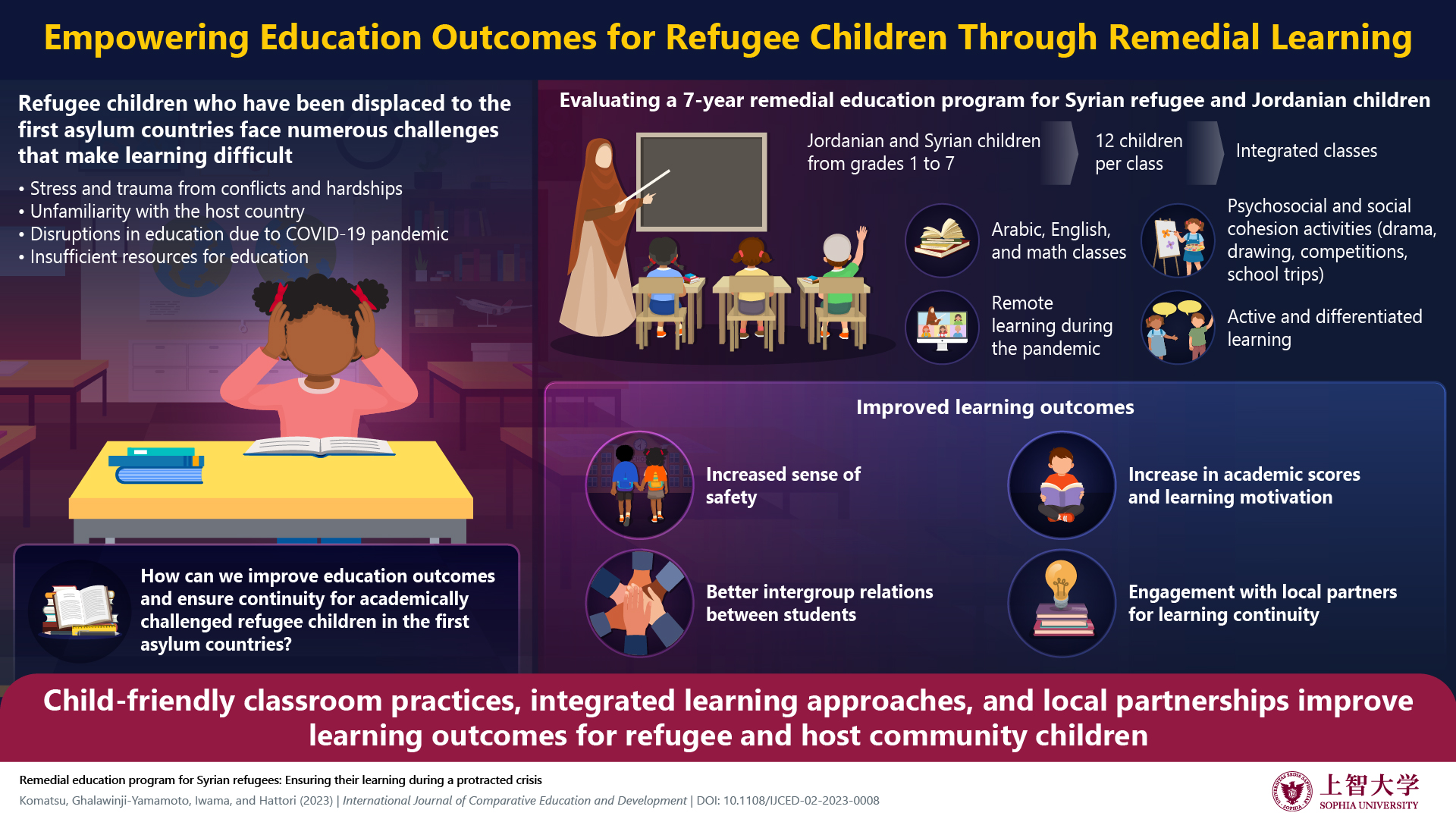
‘Access to education’ is recognized as a fundamental human right and is listed as one of the United Nations’ sustainable development goals to achieve by 2030. Quality education unlocks opportunities and gives individuals the freedom to make livelihood choices and shape their own destinies. However, an increasing number of refugee children are deprived of this fundamental right. According to the UNHCR, between 2010 and 2022, the number of child refugees doubled from 20.6 million to about 43.3 million.
An overwhelming majority of these refugees are displaced to neighboring countries that are short on resources and lack adequate educational infrastructure to accommodate the sudden influx of refugee students. Additionally, children face distress and trauma, social isolation, and economic hardship, which hinder academic performance, and increase the chances of prematurely dropping out of school. Ensuring a quality education for refugee children requires strategies that go beyond traditional educational metrics. It involves creating a safe and inclusive learning environment that empowers students with confidence and the motivation to continue their education.
In this paper, made available online on November 21, 2023, and published in Volume 26, Issue 1 of the International Journal of Comparative Education and Development on February 21, 2024, Professor Taro Komatsu from the Department of Education, Faculty of Human Sciences, Sophia University along with Dr. Kaoru Ghalawinji-Yamamoto, Research Fellow, also from Sophia University, Ms. Yukari Iwama, Senior Program Coordinator, and Ms. Sayo Hattori, former Project Manager, World Vision, Japan, evaluated the effectiveness of one such program that provides remedial education to academically low-achieving Syrian refugee and Jordanian children in Jordan.
“There are a very few studies on refugee education in first-asylum countries. Moreover, there is very limited information available on academically low-achieving refugees that fully take into account the long-term nature of a crisis,” says Prof. Komatsu.
Since the Syrian civil war began in 2011, around 700,000 Syrian refugees, half of them under 18, have sought shelter in Jordan. However, the state of education for these refugees is poor, with over 75% of children leaving school before reaching secondary level. This issue is linked to the lack of a safe environment for refugee children in schools, along with a teaching system that separates Jordanian and Syrian children into different shifts. This approach strains school resources and hampers relationships between the two groups.
To improve education outcomes, World Vision, a Non-governmental Organization (NGO) initiated a seven-year remedial education program between 2014 and 2021. This program offered extra support to academically low-achieving Syrian refugee and Jordanian children outside regular school hours. To align with Jordan’s double-shift system policy, separate remedial classes for Syrian and Jordanian students were held after school. However, during school breaks, integrated remedial classes were organized to foster better relationships between the two groups.
The program, which enrolled a maximum of 12 children in each class, aimed to enhance academic learning through an interactive learning approach that included drama and competitions. Teachers were trained in child-friendly classroom management and positive disciplining as alternatives to corporal punishment. In addition to offering classes in Arabic, English, and math, the program included psychosocial activities like recreational trips to build connections between Syrian and Jordanian students.
To assess the program’s success, the researchers examined attendance rates, and test scores, and gathered insights from teachers and students through interviews and questionnaires. The findings revealed that children enrolled in the program felt safer, and more welcomed in school. Most students expressed a strong desire to continue their education, with 52.6% being much more willing and 42.7% somewhat more willing. The program also helped Jordanian and Syrian students connect positively. Among RE students, 66.2% were open to having friends from other nationalities, compared to 41.7% of students not in the program. The direct interaction between Jordanian teachers and Syrian students also led to teachers empathizing more with the Syrian refugee children. Additionally, RE students consistently improved their math scores every year, eventually reaching a comparable level to their peers in regular Jordanian schools.
“With an integrated class that enhanced their relationships with Jordanian children and an engaging and supportive learning environment, the RE program seems to be successful in raising children’s academic achievement and motivation to pursue further education,” says Prof. Komatsu.
With the average duration of a protracted crisis being nine years, providing quality education for refugee children is a long-term need. Education outcomes can be improved through effective teaching methods, well-trained teachers, social integration programs, and collaboration with local governments.


